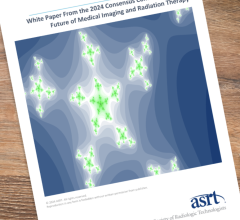
Bettina Siewert, MD
March 23, 2023 — According to an accepted manuscript published in ARRS’ own American Journal of Roentgenology (AJR), moral distress is prevalent in radiology, typically relates to systemic causes, and is a reported contributor to radiologists changing jobs.
“Urgent action is required by radiology practice leadership to address moral distress, as radiologists commonly practice in environments contradictory to their core values as physicians,” wrote corresponding author, as well as 2013 ARRS Leonard Berlin Scholar in Medical Professionalism, Bettina Siewert, MD, of Beth Israel Deaconess Medical Center in Boston, MA.
Siewert et al.’s national survey evaluating moral distress in radiology incorporated the validated Moral Distress Scale for Health Care Professionals, alongside additional questions and modifications for medical imaging, specifically. Respondents were asked to assess 16 clinical scenarios vis-à-vis frequency and severity of moral distress. Emailed to 425 members of the Radiological Society of North America on May 10, 2022, the measure of Moral Distress for Health Care Professionals (MMD-HP) was calculated for each respondent as a summary of distress across scenarios (maximum possible score, 256).
Ultimately, 98% of nationally surveyed radiologists reported at least some moral distress from presented scenarios. Moreover, moral distress caused 18% of respondents to leave a clinical position. Scenarios with the highest levels of distress were case volumes too high for safe reading, high case volumes preventing education of residents, and an overall lack of administrative action and support. Additionally, 91% selected at least one response for the following possible countermeasures to alleviate moral distress:
- Educating leadership on sources of moral distress, 71%
- Opportunities to engage in inter-specialty dialogue, 44%
- Utilizing more ethics consultation, 22%
- Expanded opportunities during residency to discuss bioethical issues to engage in bioethics training, 18%
- Expanded or additional grand rounds on bioethics, 16%
Data expressed as percentage among 85 respondents; percentages sum >100% because respondents could select multiple responses.
Noting that systemic causes of moral distress must be addressed for radiology workforce stability, “education of leadership regarding causes of distress among frontline workers is particularly needed,” the authors of this AJR accepted manuscript reiterated.
For more information: www.arrs.org


 July 31, 2024
July 31, 2024 








